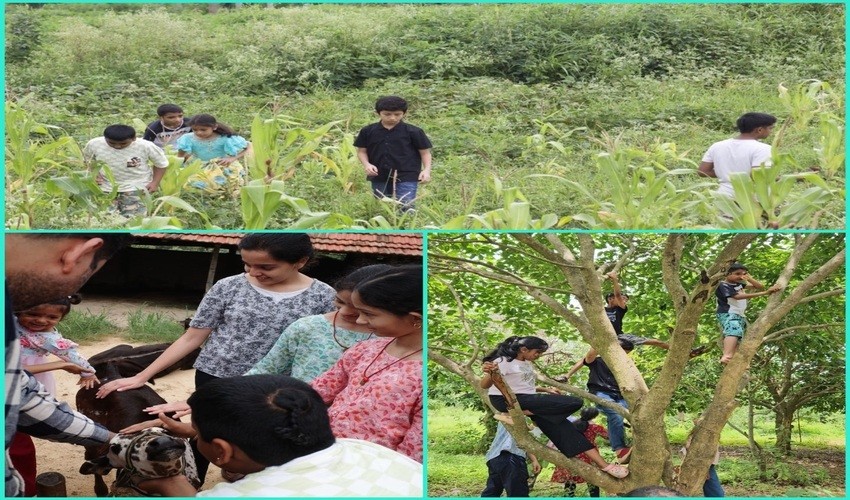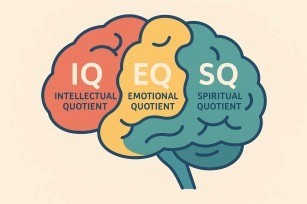Blog
AI-Powered & Personalized Learning
How to Support Your Child in an AI-Powered Learning Environment
Technology is no longer at the fringes of education—it sits at the very heart of it. Artificial Intelligence (AI) is already in our homes, workplaces, and now classrooms. From adaptive learning platforms that personalize math lessons to AI-powered tutors like Wizkids Gurukul’s “Ask Krishna Anything” bot, the education landscape is shifting rapidly.
For many parents, this shift brings mixed feelings. On one hand, there is excitement—what an extraordinary time to be alive, where our children can access personalized guidance at their fingertips! On the other hand, there is a quiet anxiety: Will AI replace teachers? Will it reduce learning to a screen-based activity? Where do I, as a parent, fit in?
These are valid questions. The truth is, AI can never replace the wisdom of a mentor or the intuition of a parent. But it can reshape the way we support our children—freeing space for deeper reflection, creativity, and emotional growth. Let’s explore how.
What AI Does Well
AI is particularly powerful at personalization. In traditional classrooms, one teacher must address 30 or more students at once, often teaching “to the middle.” The gifted child feels bored; the struggling child feels lost. AI disrupts this by adapting to each child’s pace.
At Wizkids Gurukul, students spend two hours daily with AI tutors. These tutors don’t simply present information; they identify when a child is struggling, provide targeted support, and only allow progression once mastery is achieved. This ensures depth of understanding rather than surface-level memorization.
In short: AI makes sure no child is left behind—and no child is held back.
Where Parents Still Matter More Than Ever
While AI excels at personalizing academics, it cannot replace the human touch that nurtures values, resilience, and character. This is where parents play an irreplaceable role.
Teaching Values
AI can teach your child how to solve an algebra equation, but it cannot teach compassion, patience, or respect. Parents must anchor their children in values—through conversations, role modeling, and daily rituals.Guiding Reflection
When your child interacts with an AI tutor, don’t just ask, “Did you finish your work?” Instead, ask:“What did you discover today?”
“Was there something the AI explained better than you expected?”
“If you could teach this concept to a friend, how would you explain it?”
These questions help transform information into wisdom.
Modeling Balance
The fear with technology is always overuse. Children can become passive consumers instead of active learners. Parents must model balance by ensuring that screen time is purposeful and that children spend equal time outdoors, in conversations, or exploring creative pursuits.
Creating Healthy Learning Rituals
The Gurukul tradition teaches us that learning is not just intellectual—it is spiritual and cultural. AI can support academics, but parents can enrich the overall experience through rituals that build rhythm and meaning.
Morning grounding: Begin the day with prayer, gratitude, or sloka recitation before screen-based learning.
Evening reflection: Close the day with a short sharing circle at home—“What made you curious today?”
Weekly unplugged hours: Dedicate time each week for non-digital exploration—gardening, art, or storytelling.
These practices ensure AI remains a tool within a larger, value-driven journey.
Avoiding the Pitfall of Passive Learning
The biggest risk of AI-driven education is passivity. Children may become reliant on instant answers instead of developing curiosity. Parents can counteract this by encouraging exploration beyond the screen.
For example:
If your child uses the AI tutor to learn about the solar system, encourage them to build a model or observe the night sky together.
If the AI explains a history lesson, ask your child to narrate the story at dinner in their own words.
This simple practice deepens retention and connects digital knowledge with real-world experience.
The Gift of Mentorship
In India’s ancient Gurukul system, the Guru was not merely an academic instructor, but a guide for life. At Wizkids Gurukul, we honor this spirit by blending AI guidance with mentor-based learning. AI ensures personalized academics, while mentors nurture character, creativity, and cultural grounding.
Parents, too, are part of this mentorship circle. You don’t need to “teach” in the traditional sense; your role is to mentor—to encourage, to listen, and to offer wisdom shaped by your family’s values and heritage.
Practical Tips for Parents
Stay Curious Yourself
When your child shares something they learned from an AI tutor, respond with genuine curiosity. “Wow, I didn’t know that—can you show me how it works?” This models lifelong learning.Encourage Questioning
Teach your child that AI is not infallible. Encourage them to ask: “Why does the AI say this? Could there be another perspective?” This builds critical thinking.Integrate Heritage
Balance AI-driven academics with cultural grounding. Read a story from the Mahabharata, explore an Indian art form, or celebrate a festival with meaning.Celebrate Effort, Not Just Outcome
When your child succeeds in mastering a concept through AI, celebrate the persistence it took, not just the correct answer.
Reflection: Wings and Direction
AI gives children wings—the ability to fly faster, farther, and with more freedom. But without values, emotional intelligence, and grounding, wings alone can lead them astray. Parents and mentors provide the direction that ensures flight has purpose.
In this new era, the question is not whether AI will shape education—it already is. The real question is: Will we, as parents, step up to ensure AI is used to nurture wisdom, not just knowledge?
At Wizkids Gurukul, AI is not the teacher—it is the tool. The real teachers are mentors, parents, and cultural anchors. Our model blends two hours of AI-powered personalized learning with afternoons filled with life skills, teamwork, and cultural enrichment.
We invite you to see this balance in action.
Visit our Gurukul. Meet our mentors. Experience how AI and ancient wisdom can come together to create future-ready children.
#WizkidsGurukul #HolisticLearning #BalancedParenting #LearningWithPurpose
AI-Powered & Personalized Learning
More Than Words: Instilling Values in Our Children’s Education
Sarita watched her daughter Anika gently comfort a frightened classmate who had missed the school bus. “It’s okay, I’ll walk you home,” Anika said quietly. At that moment, Sarita realized that this simple act of kindness didn’t just come from home—it also came from the values being nurtured at school.
In India, the importance of values in education runs deep—from the ancient Gurukul system to today’s digital-age classrooms. Now, more than ever, schools and parents are coming together to focus on what truly shapes a child: compassion, integrity, and empathy.
As young education advocate Rishit Mathur (Class 8) wisely said,
“Students should be taught about core values that are fundamental to create a stronger and fairer society.”
Rooted in Tradition, Relevant Today
India’s National Education Policy 2020 (NEP) places strong emphasis on value-based education. It aims to shape students who are “firmly grounded in Indian values yet possess a global outlook.” That means values like honesty, empathy, and responsibility are being taught alongside science and math.
Morning assemblies, moral stories, service projects, and reflections on leaders like Mahatma Gandhi bring these values to life. It’s not just about tradition—research shows that schools focusing on values have better learning environments and prepare students for real-world challenges.
Swami Vivekananda once said:
“The main aim of education should be to develop character, mental strength, and a spirit of philanthropy.”
At Wizkids Gurukul, we believe that a student who understands both equations and empathy is ready for life, not just exams.
Learning Values, Every Day
So how do schools teach values in daily life?
In lessons: History teachers talk about tolerance, while language teachers use moral stories and discussions.
In projects: Activities like planting gardens or organizing charity drives teach care and responsibility.
In celebration: Some schools hold “Human Values Day,” where students share real-life acts of kindness.
These experiences show children that values aren’t just taught—they’re lived.
The Role of Parents and Community
At home, parents notice values in action: a child patiently helping a sibling, returning extra change, or standing up for a friend. Communities hold parent-teacher meetings to focus on emotional learning, showing that value education is as important as academic subjects.
As one student said:
“Education without values is a complete waste.”
When schools and parents work together to model respect, honesty, and kindness, children carry those lessons into the world.
From Here On: A Shared Journey
Instilling values isn’t just the school’s job—it’s something we all do together.
Parents: What example are you setting at home?
Teachers: Do your classrooms welcome questions, mistakes, and kindness?
When children learn both knowledge and character, we prepare them not just for careers, but for life.
What small value-based habit can you practice or encourage today?
👉 Share your ideas in the comments, and explore Wizkids Gurukul philosophy that celebrate kindness, courage, and creativity. Let’s build not just bright minds—but beautiful hearts.
AI-Powered & Personalized Learning
Personalized Paths: How AI is Redefining Your Child’s Curriculum
Imagine 11-year-old Aarav logging into his school’s learning app after dinner. His math questions change in real time—more help if he’s stuck, or bonus puzzles if he’s doing well. Meanwhile, his teacher has more time to coach students, not just grade worksheets. This isn’t the future—it’s already happening in classrooms across India and beyond.
Thanks to AI-powered education platforms, learning is becoming smarter, faster, and most importantly—personalized. By analyzing each child’s learning style and progress, AI helps create a unique path for every student.
As the Times of India notes, AI tools now help teachers “design personalized lesson plans… and generate quizzes tailored to a student’s needs.” (AI’s role in transforming Indian Education: From standardized to personalised)
Adaptive Learning in Action
AI isn’t just a buzzword—it’s actively shaping learning. Adaptive software can track quiz scores and study habits, then adjust what comes next. Struggling with fractions? The system adds visual aids and extra practice. Zooming ahead in grammar? Time for a creative writing prompt.
This smart system keeps students challenged but not overwhelmed. As experts explain, it helps “dynamically adjust difficulty levels,” keeping children engaged and reducing frustration.
And it’s not just students who benefit. AI takes over routine tasks like grading and attendance, so teachers can focus on what matters most: mentoring, guiding, and inspiring.
Teaching Beyond the Textbook
India’s education system is evolving. The National Education Policy (NEP) 2020 highlights digital literacy and even includes AI as a subject from grades 9–12. Meanwhile, companies like IBM and Intel are partnering with schools to train teachers in AI and coding.
Globally, tools like the U.S.-based ALTER-Math project show how students teaching AI avatars improved their own understanding. The takeaway? When tech is interactive, learning becomes fun and effective.
But there’s a challenge: digital access. In many rural areas, children are excited to use technology, but schools often lack internet or devices. That’s why inclusive solutions—like AI content in local languages or offline access in computer labs—are key to bridging this gap.
What Can Parents and Educators Do?
As a parent in 2025, you’re part of this exciting change. Here’s how you can help:
Talk to your child’s school about using adaptive learning platforms.
Explore AI-based educational apps at home that match your child’s pace and interests.
Support teachers by encouraging AI training and sharing feedback.
And most importantly—be a learning partner. Use dinner conversations to discuss new topics, connect lessons to real life, and encourage curiosity. AI may guide the path, but your presence makes the journey meaningful.
Are we preparing our children for exams—or for life?
👉 Join the conversation below. How are you using AI tools at home or school? Share your thoughts, and explore the latest value-driven and tech-smart challenges at Wizkids Gurukul!









